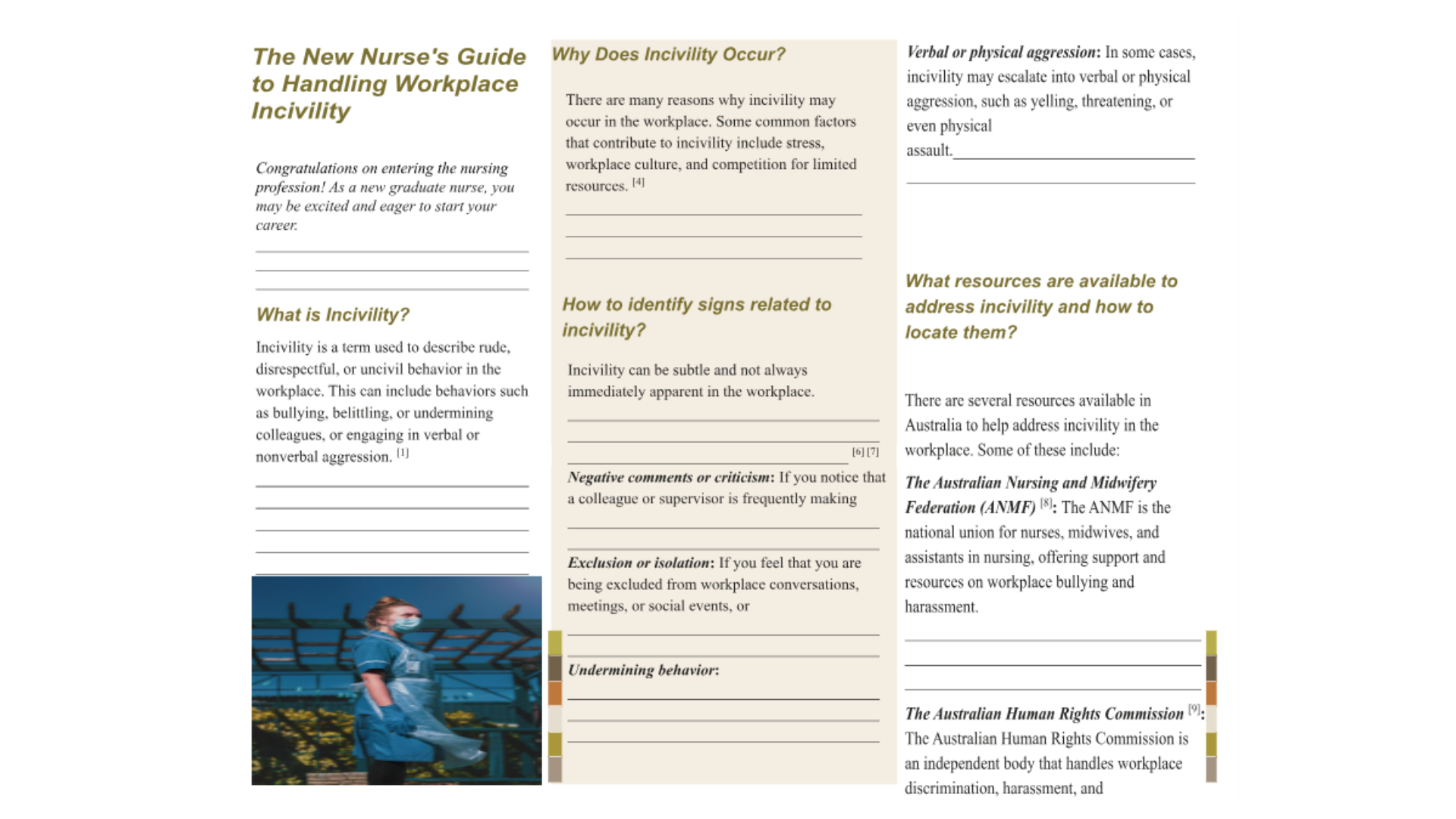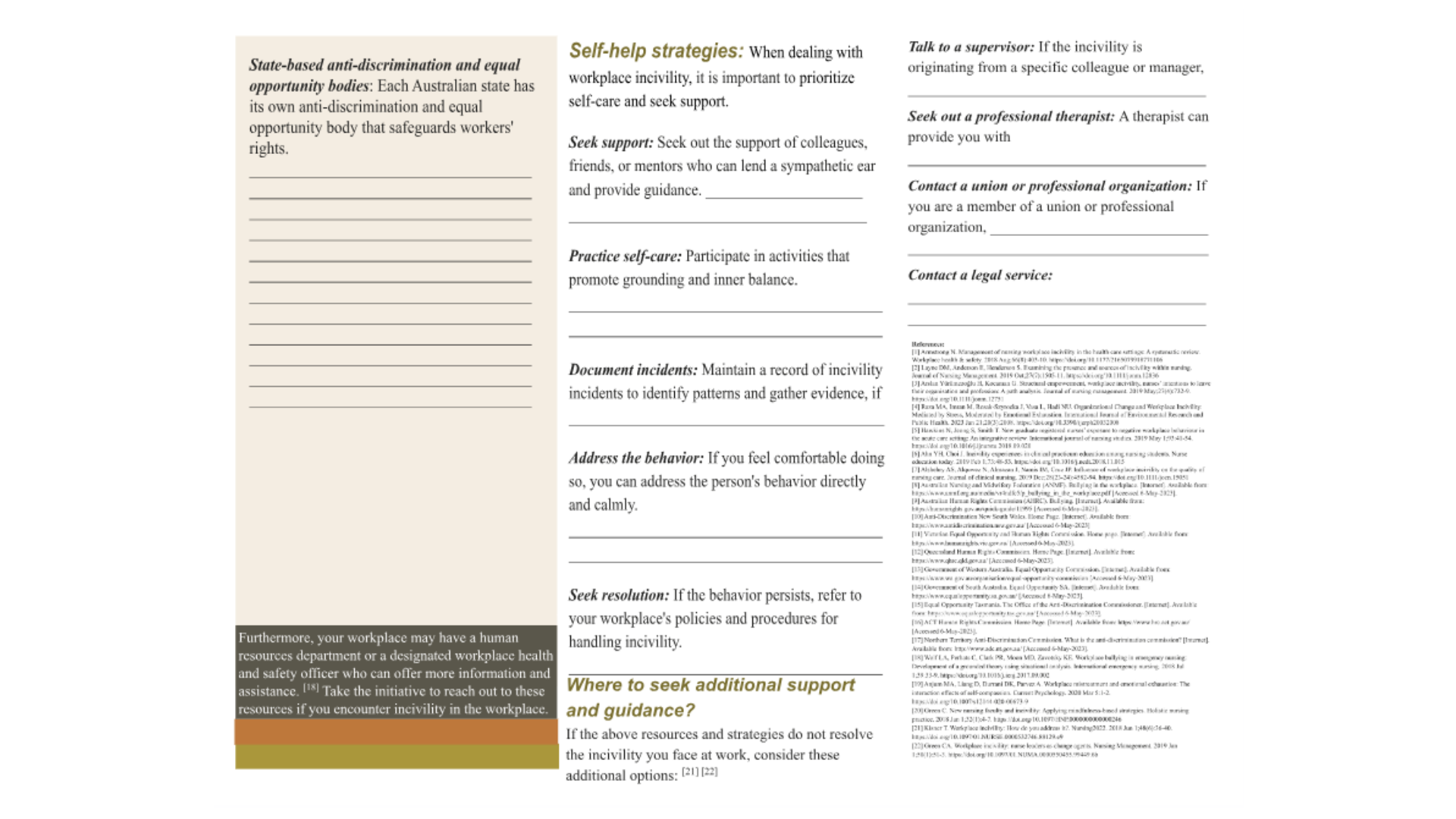NURBN3032 Managing a Transition to Practice Issue Assignment Help

Question
NURBN3032: This nursing assignment for Federation University Australia aims to assess the student’s ability to handle a transitional issue that may affect recently graduated nurses. The students are supposed to complete two sections for a successful completion of this assignment. These include a self-care guide brochure along with a 1200-word written discussion on the transitional issue identified by the student. The self-care guide brochure should be developed in a manner that provides instructional materials to help recent graduates understand the transitioning problem and help them identify potential solutions for the same. The written discussion should highlight the impact such transitioning issue might have on the professional along with providing a supporting document for the brochure.
Solution
The solution of this nursing assignment comprises two parts- a self-care guide brochure created by our highly-skilled experts, as well as a written discussion that serves as a supporting document for the brochure. The transitional issue that impacts a significant number of nursing graduates identified by our experts is the problem of incivility.
Brochure
Our experts have created a well-represented and effective brochure addressing the identified transitional issue that recent graduates might face in their professional nursing journey. Our experts have used recent literature studies to support the points proposed in the brochure. The brochure includes information about the causes and symptoms of the issue, a guide to recognizing its symptoms, and some resources available to address the problem including self-help techniques, in addition to certain additional resources in case these self-care techniques prove ineffective.


Here, we have provided snippets of the complete brochure created by our experts. If you also want evidence-based, visually appealing brochures, just give us a call at +61 871501720.
Written discussion on nursing incivility
Another part of this assessment is the written discussion. Our experts have demonstrated an in-depth understanding of the problem of incivility while also providing potential solutions so that it doesn’t negatively affect the new professional lives of graduating nurses.
The written discussion incorporates three sections: Unraveling the factors behind nursing incivility for new graduate nurses, Ramifications of nursing incivility on the individuals and the nursing profession, and Impact of incivility on nurses’ adherence to nursing codes of conduct and practice standards.
Unraveling the factors behind nursing incivility for new graduate nurses
This written discussion begins by discussing the reason why newly graduated nurses encounter this transitional problem. Our experts have presented strong evidence-based arguments of why this problem becomes so important to attend to here as well.
New graduate nurses often experience incivility in the workplace due to various factors. Firstly, the transition from being a student to a professional nurse can be challenging. New graduates may still be adjusting to the demands and expectations of the nursing profession, which can make them more vulnerable to uncivil behaviors (Taşkaya & Aksoy, 2021). Additionally, the hierarchical nature of healthcare settings, where experienced nurses hold positions of authority, can contribute to a power imbalance that leads to incivility towards new graduates (Blackstock et al., 2022). Furthermore, incivility in nursing may also arise from workplace stress and highpressure environments. Healthcare settings can be fast-paced and demanding, with limited resources and time constraints (Abdollahzadeh et al., 2017). This can create an environment where tensions run high, and individuals may be more likely to engage in uncivil behaviors (Abdollahzadeh et al., 2017). Additionally, stress and burnout among nurses have been linked to increased incivility, as individuals may vent their frustrations or resort to negative behaviors with other nurses as a coping mechanism (Loh & Loi, 2018).
Need Transition to Practice Assignment Help? Don’t hesitate to WhatsApp us at +447956859420.

Ramifications of nursing incivility on the individuals and the nursing profession
The next section of the written discussion remarks on the consequences of incivility in nursing for both the professional as well as the nursing profession. You can read a snippet of the complete section written by our experts below:
Nursing incivility has far-reaching ramifications on both the individuals who experience it and the nursing profession as a whole. Research findings consistently highlight the detrimental effects of incivility on the well-being of nurses and the overall quality of patient care (Credland & Whitfield, 2022; Shi et al., 2018). First and foremost, incivility takes a toll on the mental and emotional health of nurses. Studies have shown that nurses who experience incivility are more likely to report symptoms of stress, anxiety, depression, and burnout (Kanitha & Naik, 2021). For instance, a study by Zhang et al. (2018) found a significant association between incivility and increased levels of burnout among nurses. Such negative psychological outcomes can lead to decreased job satisfaction, lowered morale, and even intentions to leave the profession (Zhang et al., 2018). Moreover, nursing incivility directly impacts patient care. The disruptive behaviors and strained relationships resulting from incivility can create a toxic work environment that undermines teamwork, collaboration, and effective communication (Bambi et al., 2017).
We observed you looking for Managing a Transition to Practice Issue Assignment Help. Look no more, reach out to us at onlineassignmentservices1@gmail.com.
Impact of incivility on nurses’ adherence to nursing codes of conduct and practice standards
Lastly, our experts have elaborated on the influence this issue has on the nurses’ capacity to follow nursing standards and guidelines and provide patients with safe, high-quality care.
Incivility in the nursing profession poses significant challenges to nurses’ ability to adhere to the nursing codes of conduct and standards of practice, ultimately affecting the delivery of safe and high-quality patient care. To understand the impact of incivility on these aspects, it is crucial to examine the National Safety and Quality Health Service (NSQHS) Standards and the Nursing and Midwifery Board of Australia (NMBA) Registered Nurse Standards for Practice (NSQHS, 2017; NMBA, 2016). The NSQHS Standards, particularly the Communicating for Safety standard, emphasizes the importance of creating a culture of safety and respect within healthcare settings, that supports effective communication between nurses, multidisciplinary teams, clinicians and patients (NSHQS, 2017). Incivility, characterized by disrespectful behaviors and negative interactions, directly contradicts these principles. Research supports the notion that incivility hampers nurses’ adherence to the NSQHS Standards, hindering their ability to provide safe care (Alshehry et al., 2019). A study conducted by El Ghaziri et al. (2022) found that nurses who experienced incivility during the COVID-19 pandemic were more likely to report difficulties in meeting patient safety and quality improvement goals, as outlined in the NSQHS Standards.
If you were also looking for Transition To Professional Nursing Practice Assignment Help, you are at the right place. Give us a call at +61 871501720.

